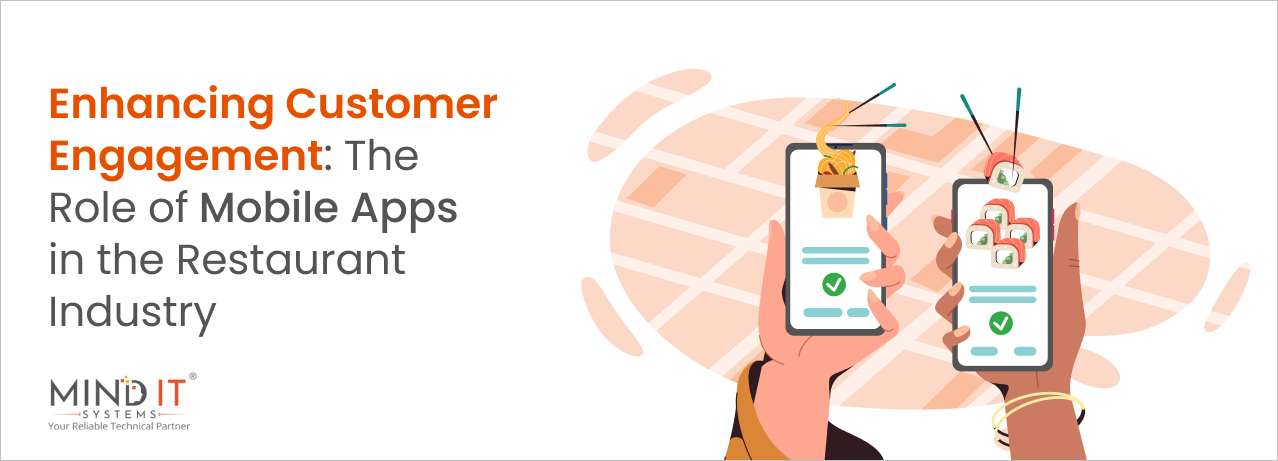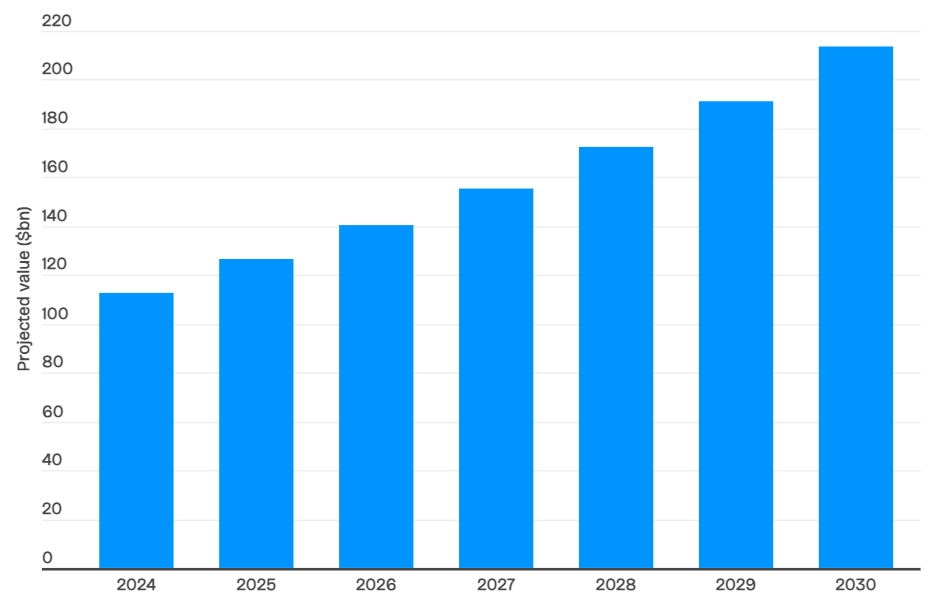
Enhancing Customer Engagement: The Role of Mobile Apps in the Restaurant Industry
Introduction
With everything becoming digital in a technology-driven era, businesses must consider digitalizing services. Failing can be challenging to keep pace in today’s competitive business environment. Unlike proprietors from any other industry, the proprietors from the restaurant industry in the modern day often face the hurdle of meeting the efficacy of delivering ever-growing customer expectations, personalized dining experience, and accessibility. Choosing to use restaurant mobile apps can be smart resolution, as it helps streamline the business process, enhance efficiency, and improve customer engagement performance.
Research shows that an average user engages with 30 applications per month, and 51% of users check their mobile apps one to ten times every day. As per the Business of Apps survey report, the food delivery industry is set to grow to $213 billion by 2030.
Expected Food Delivery Market Size 2024 to 2030 ($bn)

Image Source: Business of Apps
The graph clearly indicates the food delivery market is expected to significantly grow in 2024 and beyond. Therefore, restaurants must adopt mobile apps to stay competitive and boost their business growth. Restaurant mobile apps can serve as an all-in-one solution for customers, offering seamless online ordering, personalized loyalty programs, and exceptional dining experiences.
This blog aims to discover the power of restaurant apps in the modern restaurant industry, insights into how much it might cost to develop them, and more.
Join us on this journey to explore!
The Power of Restaurant Mobile Apps in the Modern Day
In the ever-evolving landscape of the modern restaurant industry, the advent of restaurant mobile apps is a game-changer. It’s not just about how businesses interact with customers, but also about how they innovate and grow in the digital age. The mobile applications are powerful tools that can empower restaurant owners to automate processes, reach a wider customer base, and unlock a multitude of benefits, thus driving restaurants ahead in a fiercely competitive market.
Take a closer look at how restaurant mobile apps can help to enhance customer engagement in today’s modern restaurant industry.
Enhancing Customer Engagement: Role of Restaurant Mobile Apps in Restaurant Industry
Mobile applications have become a potent tool in the modern restaurant industry, catering to the needs of both customers and restaurant proprietors. They help boost customer engagement performance and allow businesses associated with the restaurant industry to gain a competitive advantage.
Here’s how:
From Customers Standpoint:
1. Ordering Food Online
The restaurant mobile apps have made food ordering more convenient for customers. Allows them to choose from the menus, pick up the dishes or items needed, and directly place the order. Thus, automating the ordering process through mobile apps has decreased the need for waiting time for patrons. Hence, this leads to increased sales and improved customer satisfaction.
2. Table Booking
Users can easily book the table in advance using mobile apps without the necessity of in-person visits to restaurants or opting for phone calls. It helps streamline the table reservation process, increases table turnover, and allows customers to enjoy peace of mind while visiting the restaurants.
3. Sound Payment Options
Mobile apps for restaurants have made paying for meals hassle-free. Customers can securely complete transactions through mobile payment options, reducing reliance on physical payment methods and enhancing efficiency. Mobile payment integration improves accuracy, reduces human error, and ensures a satisfactory dining experience for customers.
4. Loyalty Programs and Rewards
Restaurant mobile apps have opened new scopes for customers through loyalty programs and rewards. These programs typically reward customers with points or discounts for each purchase made through the app. By offering these rewards, restaurants can encourage customer loyalty and improve the likelihood of customers returning.
5. Push Notifications and Real-Time Updates
Restaurant apps allow to send push notifications to customers, providing real-time updates on promotions, events, or changes to opening hours. It assists in keeping customers informed and engaged and can also be used to promote special deals or discounts.
6. Feedback and Reviews
Mobile apps enable customers to leave feedback and reviews on their dining experience. This feedback can improve the restaurant’s offerings and provide better customer service. In addition, positive reviews can attract new customers and enhance the restaurant’s reputation.
From Restaurant Proprietors Standpoint:
- Restaurant mobile apps can provide valuable insights into customers’ preferences, behaviours, and purchasing patterns.
- The data collected by restaurant apps can improve menus, streamline operations, and identify growth opportunities.
- Mobile applications for restaurants can reduce labour costs and improve order accuracy by automating the ordering process.
How Much Does It Cost to Build Restaurant Mobile Apps?
The cost of developing a mobile app for a restaurant may vary depending on several factors, such as the app’s features, platform, design, and complexity. A basic app may cost around $7500 to $12,000, while a more advanced app with specialized features can cost an average of $50,000 or more. It is always best to consult a professional app development maker for an accurate estimate.
Choosing the Right Restaurant Mobile Apps Maker
When selecting a mobile app maker for your restaurant, it’s essential to understand the restaurant business requirements and do consider various factors to make an informed decision.
Here are some key factors that can help decision-makers to make the right choice:
Expertise and Experience:
Look for an app development company with relevant experience and expertise in developing mobile apps. Access their portfolio to check if they have a good track record of developing mobile apps in the past. Remember that a company with good experience and expertise can better understand your requirements for restaurant mobile apps and help you with high-quality restaurant mobile apps.
Technology and Platforms:
Consider their expertise in developing apps for iOS and Android platforms. It’s also essential to ensure they have experience with the latest technologies, such as cloud integration, mobile payments, real-time updates, and GPS functionalities, which enhance your restaurant’s app experience.
UI/UX Design:
A restaurant mobile app must have an intuitive, user-friendly interface to ensure a smooth customer experience. Assess the design capabilities of the company you’re considering and prioritize their emphasis on user experience and usability in their previous work. Seek out a mobile app maker that can create visually appealing designs that don’t compromise your restaurant mobile app’s functionality and ease of use.
Scalability and Customization:
It’s important to determine if the company you’re working with can customize the restaurant app to meet your specific needs and branding requirements. Additionally, the app must be able to expand and adapt to any changes or growth in your business. Discussing your long-term goals with the app development company is recommended to ensure they can provide a solid solution that aligns with your vision.
Security and Data Protection:
When creating restaurant mobile apps, prioritize security and data protection. Choose a mobile app development company that follows the industry’s best security and data protection practices, including proper encryption and compliance with relevant regulations. It can help you create a secure and trustworthy app that builds customer trust and enhances your brand reputation.
Client Reviews and Feedback:
Before making any final decision regarding app development vendors for restaurant mobile apps, check out their past work by reading their client reviews and feedback. This helps analyze their proven track records as app makers. In addition, they reach out to their past clients to evaluate their overall performance, expertise, and communication efficiency.
Support and Maintenance:
Ongoing support and maintenance are crucial for any app, be it banking apps, online shopping apps, or restaurant mobile apps. Inquire about the company’s post-development support, responsiveness to queries, availability for technical support, and bug fixes, which may arise after the app’s launch.
Cost and Timeline:
While selecting a provider for your restaurant mobile apps, it’s critical to consider the balance between pricing and quality. In addition, it’s essential to discuss the project timeline with the app maker to ensure they can deliver the restaurant mobile apps within your desired timeframe.
Clear communication and effective project management are also essential to reduce delays in delivering your restaurant mobile apps. Thoroughly evaluate potential app development companies to find the best fit for your restaurant’s mobile app requirements.
Final Say
Mobile apps are essential for engaging customers and ensuring long-term success in the restaurant industry. By offering personalized experiences, convenient ordering, and secure payment options, mobile apps have become game-changers in attracting and retaining customers, increasing sales, and improving overall customer satisfaction.
For restaurant mobile apps to be effective, businesses must partner with a reliable development company. The proper restaurant app maker can provide businesses with a comprehensive solution that includes app design, feature development, testing, and deployment. With the right app development firm, companies can harness the power of restaurant mobile apps to drive success, increase customer engagement, and build a loyal customer base that drives sustainable growth.
Share this post
About the Author

Sujoy Roy
(Head – Digital Marketing)
From my teenage time, I had a quench to solve problems and loved leadership. Starting my career in relation management, ignited my passion for managing people. While managing I realized technology needs to be incorporated to keep pace with the changing world & do my work efficiently.

